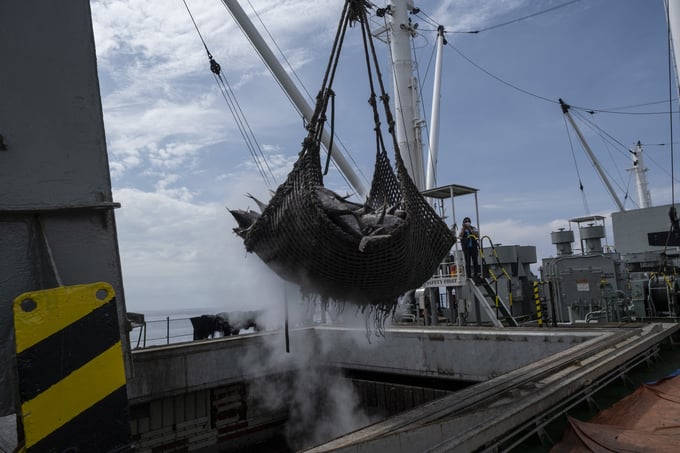May 21, 2025 | 08:54 GMT +7
May 21, 2025 | 08:54 GMT +7
Hotline: 0913.378.918
May 21, 2025 | 08:54 GMT +7
Hotline: 0913.378.918

Transshipment can take place in various locations, including ports, coastal waters and the high seas.
A key intergovernmental forum on fisheries and aquaculture has endorsed new voluntary guidelines governing the transfer of fish between ships, in a move aimed at curbing the Illegal Unreported and Unregulated (IUU) fishing that threatens the sustainability of global stocks.
The Voluntary Guidelines for Transshipment, developed by Members of the Food and Agriculture Organization of the United Nations (FAO) and presented at the 35th Session of the FAO Committee on Fisheries (COFI35), which closes today, “aim to regulate, monitor and control transshipment to support sustainable fisheries and further close loopholes that enable fish derived from IUU fishing to enter the market,” said Manuel Barange, Director of FAO’s Fisheries and Aquaculture Division.
Transshipment involves the direct transfer of fish from one vessel to another, regardless of its location, before the cargo is recorded at its final destination.
It can take place in various locations, including ports, coastal waters and the high seas. While transshipment can be essential to reduce operating costs and maximize sustainable fishing opportunities, if not properly regulated it can be used to disguise illegally-caught fish, undermining national, regional and global efforts to curb IUU fishing.
COFI had tasked the FAO Secretariat with undertaking global studies on transshipment to support the development of these Voluntary Guidelines. The research found that a lack of regulation, monitoring and control increases the risk of fish caught through IUU fishing entering the seafood supply chain, jeopardizing the sustainable management of fisheries.
Aim is to provide standards
The objective of the Voluntary Guidelines for Transshipment is to assist States, regional fisheries management organizations (RFMOs), and other intergovernmental organizations by providing standards for developing their policies and regulations that govern transshipment, with a view to integrating these in regulatory frameworks for sustainable fisheries management.
The Guidelines can support fishers, fish processors and others in the sector who act responsibly and in accordance with their fishing authorizations, while helping authorities to monitor and rebuild stocks, conserve marine biodiversity and build sustainability in the long-term.
“These guidelines are a powerful tool with the potential to make a meaningful contribution to combating IUU fishing,” said Barange.
Under the Guidelines, it is recommended that States and RFMOs should:
Ensure that vessels involved in transshipments are authorized by the relevant flag, coastal or port State and that vessels notify the relevant authorities before conducting any type of transshipment.
Adopt transparent reporting procedures to facilitate the verification of authorizations and transshipment data, allowing for effective monitoring, control and surveillance actions.
Ensure that all vessels involved in transshipments provide a declaration containing specific data about the quantities of fish, the species and any bycatch.
Share transshipment data such as vessel lists, notifications, authorizations and declarations, observer and inspections reports, infractions and sanctions.
Establish reporting procedures to collect and cross-reference information on the quantity of fish landed by species, product form, area, and country of origin for processed fish.
The guidelines will support the FAO Agreement on Port State Measures (PSMA), the first binding international agreement intended to deter and eliminate IUU fishing, which entered into force in 2016, and the updated Global Record of Fishing Vessels, Refrigerated Transport Vessels and Supply Vessels.
(FAO.org)

(VAN) Attempts to bring down the price of the Japanese staple have had little effect amid a cost-of-living crisis.

(VAN) Fourth most important food crop in peril as Latin America and Caribbean suffer from slow-onset climate disaster.

(VAN) Shifting market dynamics and the noise around new legislation has propelled Trouw Nutrition’s research around early life nutrition in poultry. Today, it continues to be a key area of research.

(VAN) India is concerned about its food security and the livelihoods of its farmers if more US food imports are allowed.

(VAN) FAO's Director-General emphasises the need to work together to transform agrifood systems.

(VAN) Europe is facing its worst outbreak of foot-and-mouth since the start of the century.

(VAN) The central authorities, in early April, released a 10-year plan for rural vitalization.